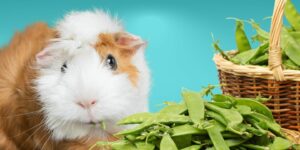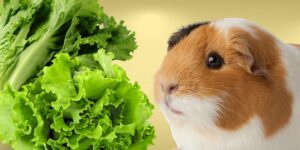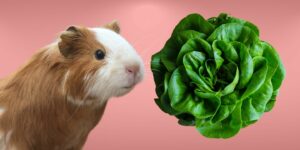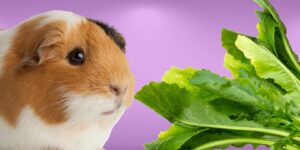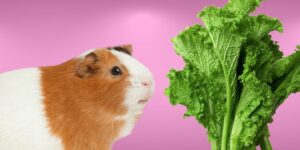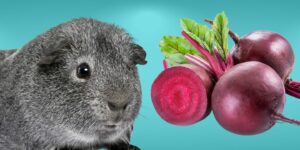Can guinea pigs eat asparagus? The short answer is yes, guinea pigs can eat asparagus. However, it should only be offered to them in moderation and as part of a balanced diet. As with any new food, it's important to introduce asparagus to your guinea pig gradually and in small amounts to ensure they don't have any adverse reactions to it.
Nutritional Benefits of Asparagus for Guinea Pigs
Asparagus is a good source of vitamins A and C, as well as several other nutrients that are beneficial for guinea pigs. These include potassium, fiber, and folate. Vitamin A is important for maintaining healthy eyes, skin, and immune system, while vitamin C helps support a strong immune system and aids in the absorption of iron. Potassium is important for maintaining healthy nerve and muscle function, and fiber is essential for maintaining a healthy digestive system.
How to Feed Asparagus to Guinea Pigs
When feeding asparagus to your guinea pig, it's important to only offer them a small amount at first to make sure they don't have any adverse reactions to it. You can gradually increase the amount over time if they enjoy it and tolerate it well.
It's also important to only feed your guinea pig fresh, clean asparagus that has been washed thoroughly. Avoid offering them canned or frozen asparagus, as these can be high in sodium and other additives that aren't good for your guinea pig's health.
When preparing asparagus for your guinea pig, be sure to remove the tough, fibrous ends and cut the spears into small, bite-sized pieces that are easy for them to chew and swallow. You can then offer them the asparagus either on its own or mixed with their regular food.
How Much Asparagus Can Guinea Pigs Eat?
As with any new food, it's important to introduce asparagus to your guinea pig gradually and in small amounts to ensure they don't have any adverse reactions to it. A good rule of thumb is to offer your guinea pig no more than a few small pieces of asparagus at a time, and to only feed it to them a few times per week.
It's also important to remember that asparagus should only be offered to your guinea pig as part of a balanced diet that includes a variety of other healthy fruits and vegetables. This will help ensure they get all the nutrients they need to stay happy and healthy.
Potential Risks and Side Effects of Feeding Asparagus to Guinea Pigs
Although asparagus can be a healthy addition to your guinea pig's diet when fed in moderation, there are also some potential risks and side effects to be aware of. These include:
Oxalates
Asparagus contains oxalates, which can contribute to the formation of urinary stones in guinea pigs. This is especially a concern for guinea pigs that are prone to bladder stones or have a history of urinary issues. To minimize this risk, be sure to only feed your guinea pig asparagus in moderation and balance it with other low-oxalate foods.
Gas and Bloating
Asparagus is known to cause gas and bloating in some animals, including guinea pigs. If you notice that your guinea pig seems uncomfortable or bloated after eating asparagus, it may be best to discontinue feeding it to them and try another vegetable instead.
Allergic Reactions
Though rare, some guinea pigs may have an allergic reaction to asparagus. If your guinea pig shows signs of itching, swelling, or difficulty breathing after eating asparagus, stop feeding it to them immediately and consult a veterinarian.
Alternatives to Asparagus for Guinea Pigs
If you're looking for other healthy vegetables to include in your guinea pig's diet, consider the following options:
Bell Peppers
Bell peppers are an excellent source of vitamin C and antioxidants, making them a great addition to your guinea pig's diet. Be sure to remove the seeds before feeding them to your pet.
Cucumbers
Cucumbers are low in calories and high in water content, making them a hydrating and refreshing treat for your guinea pig. Just be sure to remove the seeds and peel before feeding them to your pet.
Leafy Greens
Leafy greens, such as kale, spinach, and romaine lettuce, are packed with nutrients that are beneficial for guinea pigs. However, it's important to rotate these greens and not feed the same type every day, as some greens can be high in oxalates or calcium.
Carrots
Carrots are a good source of vitamin A and can be a tasty treat for your guinea pig. However, they should be fed sparingly due to their high sugar content.
Conclusion
Asparagus can be a healthy and nutritious addition to your guinea pig's diet when fed in moderation and as part of a balanced diet. Be sure to introduce it gradually and monitor your pet for any adverse reactions or side effects. If asparagus doesn't agree with your guinea pig, consider trying one of the alternative vegetables mentioned above to ensure your pet gets the nutrients they need to stay healthy and happy.



